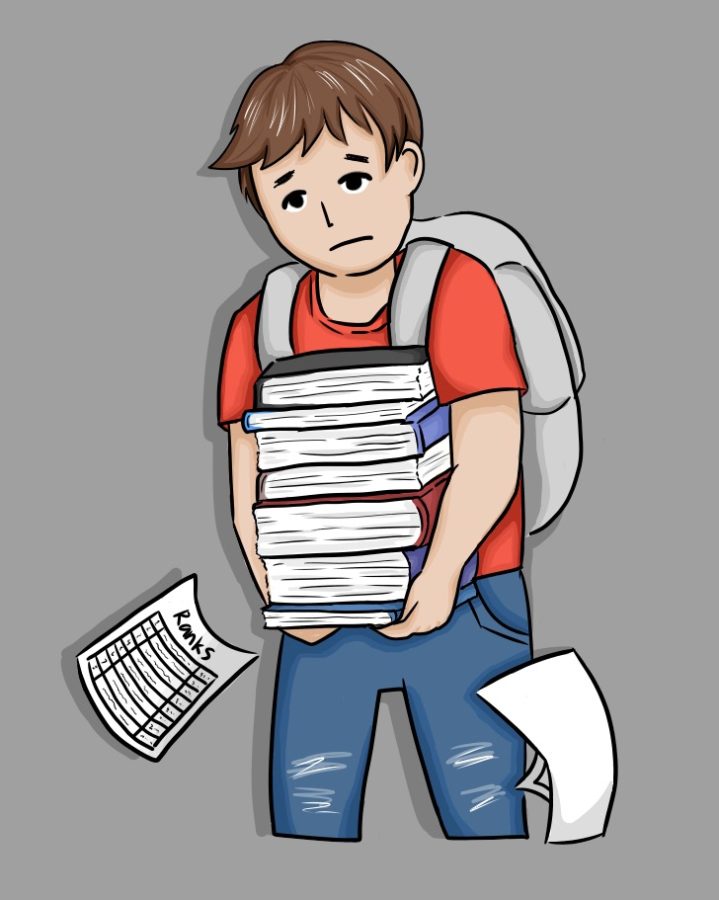Ranked for success
GPA competition creates unhealthy academic environment
Students at Coppell High School and across the nation are put under heavy, often unnecessary stress, when ranked within their grade. Many high schools, including CHS, have moved away from a comprehensive class ranking system.
October 19, 2017
From celebrity haircuts to best-selling novels, people are obsessed with ranking, listing and every other form of ordering. However, when this obsession is translated into the classroom, problems start to arise.
Every year in thousands of schools across America, students wait in anticipation for class ranks to be released. Class ranks are a mathematically configured listing of all the students of a grade in order from best to worst grade point average.
The student with the best GPA, or highest rank, is the valedictorian. The second-ranked student is known as the salutatorian.
With the release of these ranks, students instantly become more competitive, stressed and even jealous of their classmate’s ranks. In fact, it is fairly common to see students stop having active social lives outside of school or just lose friends altogether because of the added stress.
Because of the competitive drive that is associated with ranks, many students would rather stay home and study than hang out with their friends.
“[Students] have to get rest and have some fun in life. They can’t spend all their time on school,” Coppell High School lead counselor Debbie Fruithandler said.
People often associate ranks with cheating, which, in essence, is true. After being given knowledge of where they stand in the class, many students will cheat their way up the ranks.
Despite this, there are upsides to the ranking system. Many colleges, such as the University of Texas at Austin, have an automatic acceptance policy for the top seven percent of each high school’s graduating class. By releasing class ranks, high schools give many students the chance of admission into a top college.
“There’s a little bit of a misconception,” Fruithandler said. “[The ranking system] has helped our learners more than they know.”
In addition, class ranks are a good way of keeping rigor in the classroom. After all, a little competition never hurt anybody, right?
Well, not always; there is a fine line between healthy competition and flat-out cheating. Being pitted against one’s classmates often causes students to overload their schedule, creating stress for the student that would not necessarily be there without the ranking system. This, more often than not, leads to cheating within the classroom.
It is not uncommon for students to check and compare homework assignments or in-class activities with each other. In fact, many teachers even encourage this collaboration. But, all it takes is one person to forget their math homework and all of the sudden, collaboration becomes collusion and eventually out-right cheating. This is often spurred on by ranking due to the push to compete and match higher-ranked students.
But being in higher-level classes, pressured by class ranks, does not always lead to cheating. Many high-level courses (AP/IB) set students on a path of success at the college level. So in this aspect, class ranks push students to do better, giving them a competitive drive to work harder and do better.
All in all, class rankings tend to encourage cheating and other forms of academic dishonesty more than it seems to drive students to do well. Many schools, including Coppell High School, are moving away from ranking and making the right decision in doing so.
“The only place that class rank is relevant is in the state of Texas where it matters [to colleges] that you’re in the top 10 percent,” Coppell High School Principal Dr. Nicole Jund said. “GPA and… engagement in community involvement is more important.”
Coppell stopped ranking students in the class in 2010 and has since moved to just ranking the top 10 percent for college admission/scholarship purposes.
Although ranking students can give them a competitive drive, it often causes more harm than good. Because of this, schools should move towards a schooling system that does not have ranks, but still encourages work ethic and friendly competition.
Follow Nicholas on Twitter @Nick_Pranske8












Jane • Jan 3, 2018 at 11:12 am
Respectfully, Veena, I would like to counter your point. Yes,there are definitely kids at the top of the class that are honest-I congratulate those because it is really hard to shine in a system where so many kids think it is ok to cheat, but some of the others are huge, big cheaters. Yes, they need to have studied if the test is within hours, but in a system where even one point can change the GPA (and more important, class Rank), that one difficult question (that most kids will miss), will be answered by the cheaters because the cheaters know it beforehand (sharing with kids from earlier class periods). And that is all it takes to tip the ranks. It is very sad. The kids who work hard are demotivated because the cheaters get away with it. Sadly this has been going on for years, but without “proof” it is hard for a teacher to do anything about it.
Veena A • Oct 24, 2017 at 1:07 pm
A good article highlighting the importance or unimportance of ranking. However it is filled with wrong and misleading information about students who rank at the top. The high school curriculum is very challenging if you decide to pile up on AP/IB-GT courses. It will chew up kids who are not really prepared for those courses. Cheating will not lead to success in those courses. Unless a student is truly committed and driven, has the ability to understand the subjects, they cannot succeed. Its tests, quizzes, assignments day-in day-out. For a student to have high A’s in all courses its impossible to cheat on 5-6 AP courses everyday . One has to plan to cheat and honestly it’s easier to study and make a grade than cheat on those courses. The courses test the students in many ways. One may get off by cheating on a small quiz but it would be impossible to make the same high grade on Tests or final semester exams or AP exams. So I request you to change the tone of this article and reflect positively about ranking and the students who work hard to achieve that success.
Thanks,
Veena